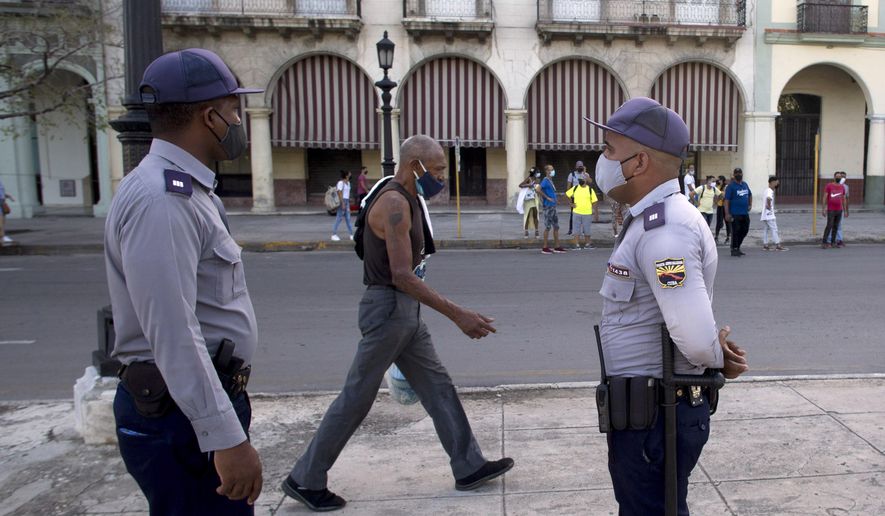More than 140 Cubans have been detained or disappeared in a widening crackdown by Cuba’s security forces, according to international rights advocates monitoring the aftermath of the anti-regime protests that swept the island nation on Sunday.
While demonstrators did not return to the streets of Havana or other cities in force for a second day on Tuesday, tensions remained high in Havana, where security forces have reportedly fanned out across the Cuban capital and in some cases gone door-to-door searching for organizers of the nation’s largest protests in decades.
U.S. and European officials are demanding accountability from Cuban President Miguel Diaz-Canel. Officials in Spain, particularly, expressed outrage Tuesday that one of those detained by Cuban authorities is a journalist who works for the conservative Spain-based newspaper ABC.
Spanish Foreign Minister Jose Manuel Albares called on Cuba to immediately release Camila Acosta, who had covered Sunday’s protests and was taken into custody on Monday, according to Reuters.
“Spain defends the right to demonstrate freely and peacefully and asks the Cuban authorities to respect it,” Mr. Albares said via Twitter on Tuesday. “We demand the immediate release of Camila Acosta.”
Ms. Acosta describes herself on Twitter as an independent Cuban journalist. Reuters reported that she had been writing for ABC and uploading photos of the protests to social media.
Human rights and civil liberties advocates, meanwhile, say dozens of others have also been detained in a crackdown that accelerated on Monday night.
Erika Guevara-Rosas, the Americas director for the London-based group Amnesty International, told The Guardian newspaper that at least 140 Cubans were believed to have been detained or had disappeared.
“The idea is to punish those who dare to challenge the government … and send a message” that no further protests would be tolerated, Ms. Guevara-Rosas told The Guardian. She also said spontaneous and peaceful rallies had taken place in at least 48 separate locations in Cuba.
Thousands marched in Havana on Sunday to protest food shortages and high prices amid the coronavirus crisis. The mainly state-controlled Cuban economy, which was already weak before the global pandemic hit, reportedly shrank by more than 10% in 2020.
While the economic crisis played a major role, there were also signs of a collective outburst against what many in an increasingly digitally connected Cuba view as outdated and draconian civil liberties restrictions by the regime.
Raul Castro granted Mr. Diaz-Canel control over Cuba‘s ruling Communist Party in April.
SEE ALSO: Bernie Sanders calls on Cuban government to ‘refrain from violence’ against protesters
This week’s developments have raised questions about the Biden administration’s policy toward the regime. The administration says it is engaged in a Cuba policy review and Mr. Biden on Monday expressed support for the protesters, calling on the Diaz-Canel government to respect their right to engage in “peaceful protest and the right to freely determine their own future.”
Many saw the statement as a sign the administration is likely to keep U.S. sanctions pressure on Cuba, continuing with a policy of former President Donald Trump.
The Trump administration increased sanctions after a period of detente during the prior Obama administration, which had sought — with Mr. Biden as vice president — to normalize relations with Havana.
Mr. Diaz-Canel has spent this week claiming U.S. sanctions and a trade embargo, in place against Cuba for decades, are to blame for the island nation’s woes.
There are signs some regional players, including U.S. trade partner Mexico, are tacitly aligned with the Cuban regime.
Mexican President Andres Manuel Lopez Obrador made headlines Monday by asserting the ongoing U.S. embargo amounts to a blockade that must be lifted. “The truth is that if one wanted to help the Caribbean island of Cuba, the first thing that should be done is to suspend the blockade,” Mr. Lopez Obrador said at a press conference.
Cuban Americans want Mr. Biden to stand his ground against the Cuban regime.
Demonstrations were reported in several Florida cities and towns for a second day on Tuesday, with protesters calling for the regime’s downfall. A demonstration also occurred outside the White House, with roughly 50 activists demanding Mr. Biden show stronger support for the protesters in Cuba.
• Jeff Mordock contributed to this article.
• Guy Taylor can be reached at gtaylor@washingtontimes.com.




Please read our comment policy before commenting.